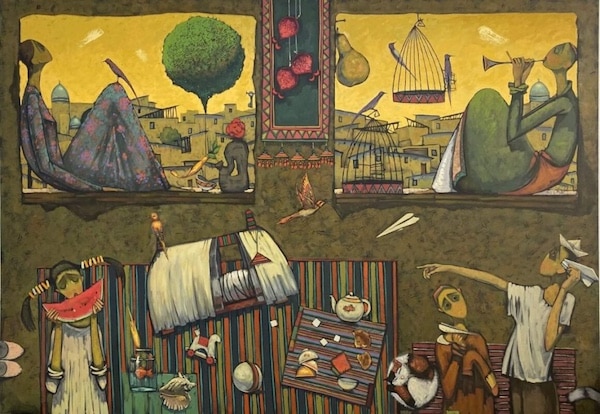Dear friends,
Greetings from the desk of Tricontinental: Institute for Social Research.
I have written this newsletter before. In fact, I could write this newsletter every year when a new Global Report on Food Crises is published. The report rests on four points:
-
The number of people who are hungry is greater now than last year.
-
The amount of food produced this year is greater than that produced last year.
-
There is enough food to feed the total world population, and more.
-
How do we explain why people are hungry?
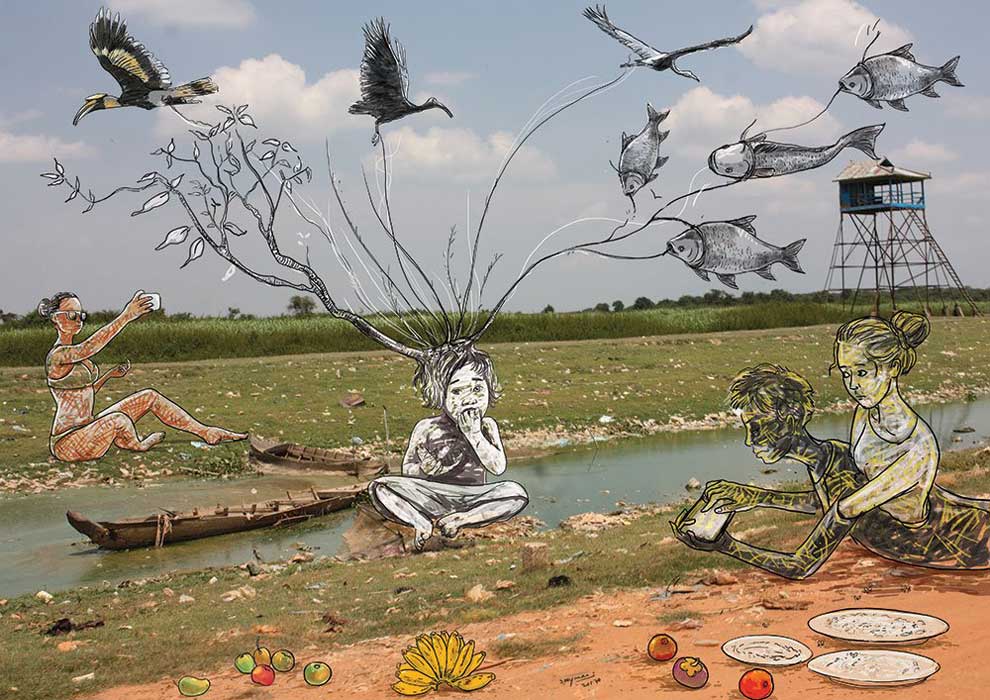
Sao Sreymao (Cambodia), Left Over, 2017.
Let’s add in the data.
Point no. 1: 733 million people faced chronic hunger in 2023, according to studies from the Food and Agriculture Organisation (FAO), World Food Programme, World Health Organisation, International Fund for Agricultural Development, and United Nations Children’s Fund.
Point no. 2: The world’s farmers and agribusinesses produced 11 billion metric tonnes of food (including meat, fish, and 9.6 billion metric tonnes of primary crops—such as maize, rice, and wheat) in 2022, as the FAO reports.
Point no. 3 is made clear by a simple calculation with one premise.
Premise: A person eats one tonne or 1,000 kilograms of food per year (the FAO standard for global average food consumption is 2,800 kilocalories per person per day).
Calculation: If one tonne of food is needed for one person, and there are eleven billion tonnes of food produced, then there is enough food for eleven billion people.
Conclusion: There are currently eight billion people on the planet. Therefore, there is enough food for all the people on the planet, with enough surplus to feed an additional three billion.
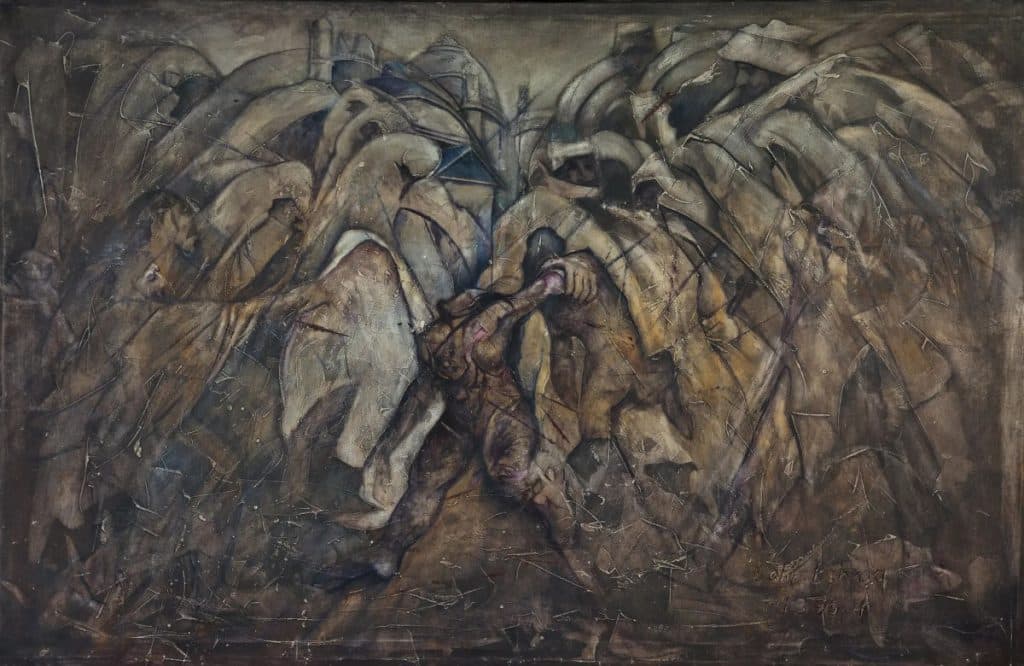
Latif Eshraq (Afghanistan), Farkhunda, 2017.
Point no. 4: How do we explain why people are hungry?
There are many reasons for the acuteness of hunger, but none of them can be attributed to a lack of food due to population growth, as Malthusians, who believe that population growth outstrips food production, allege.
There are at least three reasons why near famine persist in many parts of the world.
-
First, wars destroy agricultural and food distribution systems. This is the most obvious creator of hunger. This is the reason why there is famine in Sudan, a country that has the largest land area for farming in all of Africa and—if there were no war—could become the breadbasket of Africa. Despite the war, Sudan is the world’s largest exporter of oily seeds (groundnuts, safflower, sesame, soybean, and sunflower). Around 80% of the world’s gum Arabic is produced in Sudan’s countryside. But most fields cannot be tended, and many of the farmers have been forced off the land or forced to pick up a gun because of war.
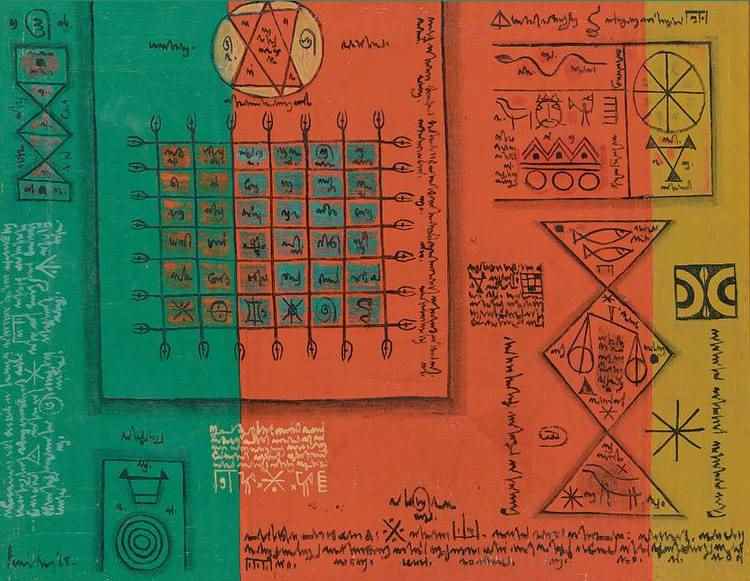
K. C. S. Paniker (India), Words and Symbols, 1968.
-
Second, an ugly old habit of waste remains with us. One-fifth of all our food is lost or wasted (the equivalent of one billion meals a day), two-thirds of all consumption-level waste takes place in the richer countries, and 60% of global food waste happens at the household level. In the richer countries, most food waste happens at the retail and consumer stages largely because of the high level of processing and packaging as well as plate waste in households and restaurants. In the poorer countries, most food waste takes place at the point of production (due to bad weather, pests, and disease) and in storage (due to poor facilities with inadequate refrigeration and inefficient transportation systems).
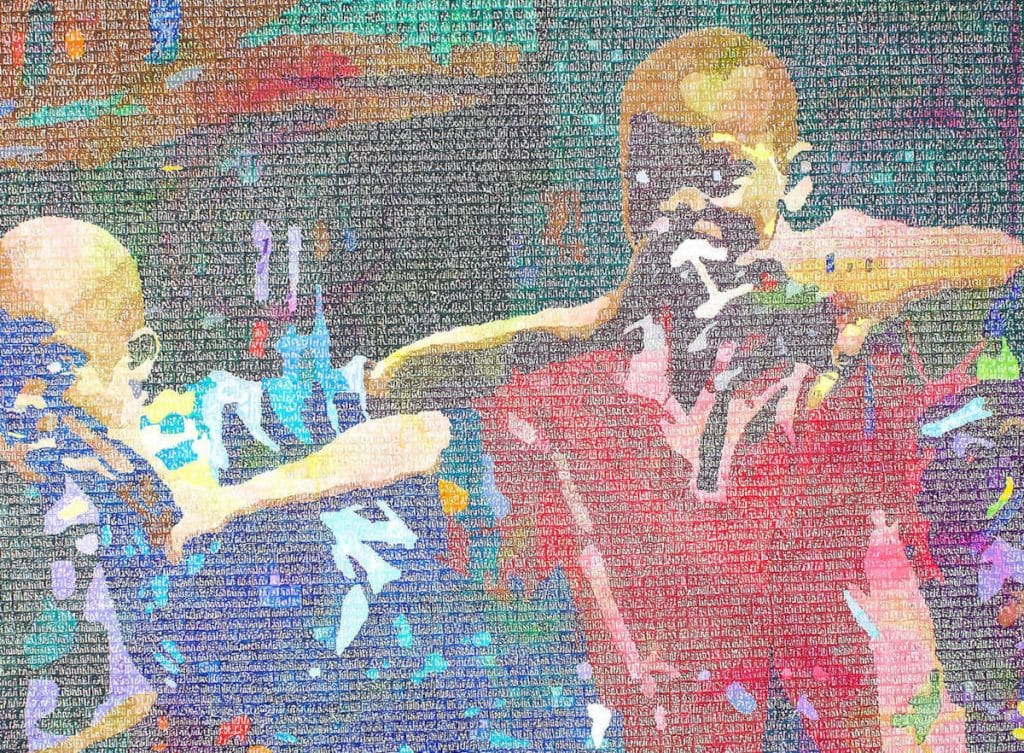
Alioune Diagne (Senegal), XALÉ TEY—Enfants d’aujourd’hui, 2020.
-
Third, the main reason why people do not eat is that they do not have the money to eat. Inequality, in other words, is the engine of hunger. Let us once more list the facts:
-
Over 700 million people in the world live on less than $2.15 per day and cannot afford to buy food.
-
3.4 billion people live on less than $5.50 per day, which makes it unlikely that they can afford to eat.
-
In 2023, the world’s total wealth was approximately $432 trillion. Of that, the top 1% of the global adult population collectively owned 47.5% of the world’s total wealth, equivalent to $213.8 trillion (an average of $2.7 million per person). The bottom 50%, or 4 billion people, owned less than 1% of global wealth or $4.5 trillion ($1,125 per person). The yawning gap of wealth inequality continues to increase every year.
-
Those with lower incomes simply cannot afford to eat because the inflation of food and fuel prices consume their budgets.
-
Hunger rates among women are higher than among men because when there is less food in a household, women eat less. In women-headed households, hunger rates are higher.
-
While indigenous peoples constitute less than 5% of the world’s population, they represent 15% of the extreme poor and suffer higher rates of hunger than other communities.
-
As the FAO argued in 2021, ‘Poverty remains the main cause of food insecurity worldwide, as people lack the resources to access adequate food, even when it is available’.

Aubrey Williams (Guyana), Hymn to the Sun V (Olmec-Maya and Now), 1984.
A newsletter like this, resting on statistics, cannot explain the damage that poverty does to the human spirit. The sullenness of poverty produces a kind of fatalism which makes it difficult for the impoverished person to explain their situation. Cold statistics alone do not explain to the impoverished the reality of their circumstances, which they already know very well. Sometimes, it is poetry that is best able to articulate the capitalist structure of poverty and the impact it has on the human spirit.
Nicolás Guillén (1902—1989) was one of the greatest Cuban poets both before and after the revolution. In 1931, he published the poem ‘Caña’ (Sugarcane) in his collection Sóngoro Cosongo, a title based on the sound of the Afro-Cuban drums:
| El negro junto al cañaveral.El yanqui sobre el cañaveral. La tierra ¡Sangre |
The Black man beside the canefield.The Yankee atop the canefield. The land Blood |
Isn’t that the truth?

Saïdou Dicko (Burkina Faso), La branche de la liberté (The Branch of Liberty), 2018.
If you want to end hunger, you must end poverty. In 2021, the Chinese people ended absolute poverty in their country. By November 2025, the people of Kerala, India, will have ended extreme poverty—one year ahead of their target date. Vietnam is on the road to eliminating absolute poverty. This was also the ambition of Burkina Faso under Thomas Sankara (1949—1987) and has been reborn under the country’s new leader, Captain Ibrahim Traoré. Not through charity or foreign aid, but through self-reliance. At the National Conference for the Committees for the Defence of the Revolution in Ouagadougou on 4 April 1986, Sankara declared, ‘We must succeed in producing more—producing more, because it’s natural that he who feeds you, also imposes his will’. In 2023, Traoré raised Sankara’s spirit and said, ‘Our predecessors taught us one thing: a slave who cannot assume his own revolt does not deserve to be pitied. We do not feel sorry for ourselves, we do not ask anyone to feel sorry for us. The people of Burkina Faso have decided to fight, to fight against terrorism, in order to relaunch their development’. The people of Burkina Faso, today, he added, are asking the following questions:
We do not understand how Africa, with so much wealth on our soil, with generous nature, water, sunshine in abundance—how Africa is today the poorest continent. Africa is a hungry continent. And how come there are heads of state all over the world begging? These are the questions we are asking ourselves, and we have no answers so far.
But they will soon have answers, and when they do, they will ask new questions, and then history will move forward.
Warmly,
Vijay

